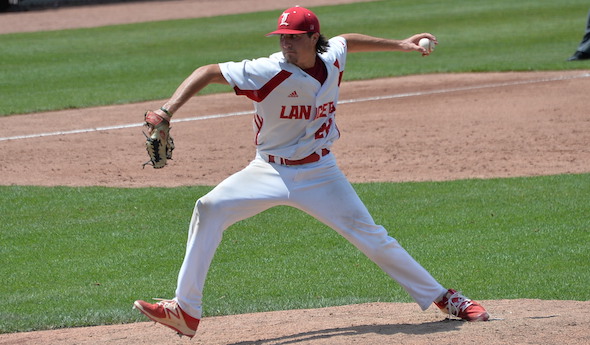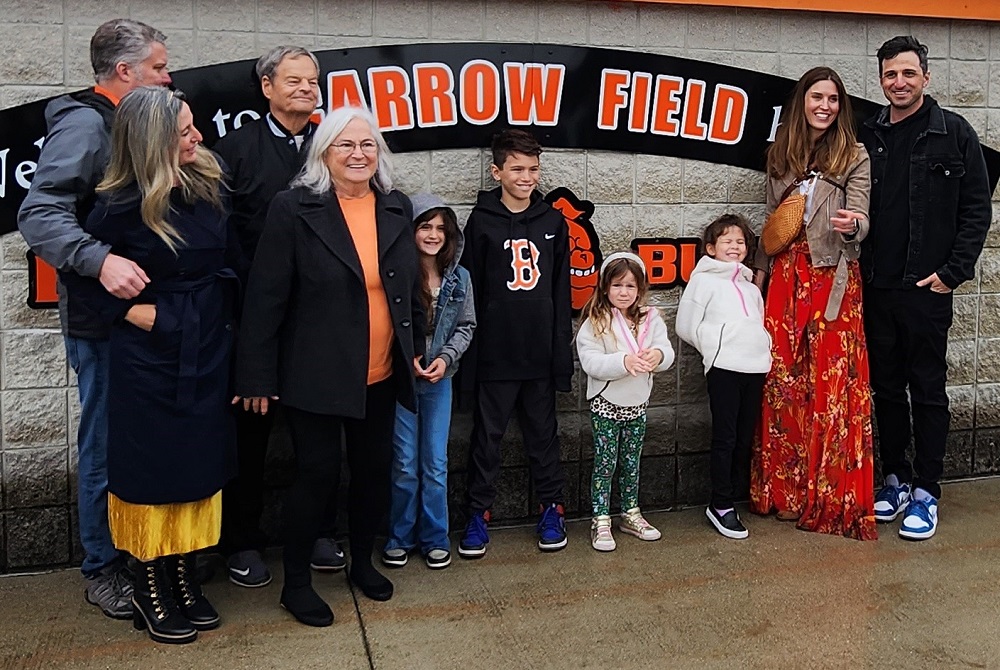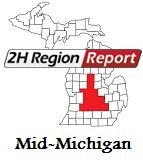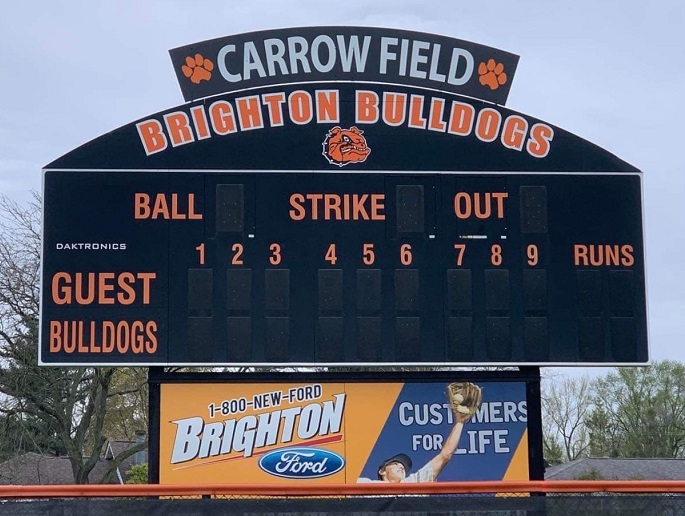
Lakeshore, John Glenn Win Big in D2
By
Tom Markowski
Special for Second Half
June 15, 2017
EAST LANSING – Stevensville Lakeshore trailed 1-0 and did not have a hit until leadoff batter Ryan Remus stepped to the plate to open the bottom of the third inning of Thursday’s Division 2 Semifinal against Chelsea.
That’s when the game changed. Remus singled, went to second on a balk and with a head-first slide scored the tying run – swinging the momentum clearly toward the Lancers.
Lakeshore went on to score four runs in that inning and defeat Chelsea 7-1 at Michigan State’s McLane Stadium.
Lakeshore (35-6), headed to a Final for the first time since 1990 when it won the Class B title, will play Bay City John Glenn for the championship at 11:30 a.m. Saturday. Glenn will make its second Final appearance in search of its first MHSAA title.
Glenn (34-8) hammered Dearborn Divine Child, 15-4, in the second Semifinal, with 15 hits and a seven-run second inning to set the tone.
Cal Barrett homered with two outs in the first Semifinal to stake Chelsea to a 1-0 lead. The Bulldogs allowed three walks over the first two innings, but Remus’ at bat helped turn the game around. Standing on second after the balk, Remus got a good jump on Trey Thibeault’s line drive single to right center. Hunter Neff’s throw to Barrett seemed to beat Remus to the plate, but the senior second baseman alluded the tag with his slide.
Tyler Mojsiejenko followed with another single to center, and when the ball got past Neff, Thibeault scored for a 2-1 lead. Starting pitcher Connor Brawley tripled to score the third run, and Brawley came home on Max Gaishin’s sacrifice fly.
From there Brawley held Chelsea (31-10) to two hits over the final four innings, and the junior lefthander finished with a complete game five-hitter. He walked none and struck out five.
Remus said he didn’t notice the balk, but was aware that he started something big.
“I was just trying to get myself a good lead,” he said. “I didn’t look to see the throw (from center). I trusted my on-deck hitter (Brawley). He knew when it was coming and gave me the (slide) sign. After that we started hitting the ball hard and finding holes.”
Chelsea coach Adam Taylor didn’t think those four runs changed the momentum. He said his team had come back from greater deficits and was confident they’d do it again.
“The difference was their starter,” Taylor said. “He threw all three pitches for strikes, and in high school that works. Get it and go.
“When people scored on us throughout the year, we did a good job of coming back. It goes back to what I said. Their pitcher was the difference.”
Lakeshore had nine hits, and Mojsiejenko (with three) was the only batter with more than one.
“That balk kind of loosened us up,” Lakeshore coach Mark Nate said. “Sometimes it takes us awhile. That slide was big. Credit my third base coach (Matt Cotton) for that.”
Bay City John Glenn 15, Dearborn Divine Child 4
John Glenn had four hits in the second inning, and add in three Divine Child errors and the Bobcats had a big, early lead.
 “They had us for three (errors), and it could have been four,” Divine Child coach Dan Deegan said. “They teed off on every one of our pitchers.”
“They had us for three (errors), and it could have been four,” Divine Child coach Dan Deegan said. “They teed off on every one of our pitchers.”
Brad Mularz went all five innings and allowed five hits for the Bobcats. Getting those seven quick runs made his job that much easier.
“It means a lot to just go five,” Mularz said. “It keeps us fresh. With (Friday) being a day off, we’ll be ready.”
Corey Langenburg had two hits and four RBI to lead Glenn. Matt Fisher, Ben Cnudde and Mularz each had three RBI, and Tanner Gilles, the eighth batter in the lineup, went 4-4.
“They’re a loose bunch,” Glenn coach Jeff Hartt said. “Sometimes they’re too loose. When you put the ball in play in high school baseball, good things can happen.”
Divine Child finished 23-20.
PHOTOS: (Top) Lakeshore pitcher Connor Brawley makes his move toward the plate during Thursday's Semifinals. (Middle) Bay City John Glenn's Brad Mularz delivers a pitch.

Brighton Names Baseball Field for Program Builder, Longtime Leader
By
Tim Robinson
Special for MHSAA.com
May 4, 2023
BRIGHTON — Mark Carrow didn’t know what to expect April 22 when he arrived at Brighton High School’s baseball field, where he was the guest of honor for a ceremony officially naming it Carrow Field.
 “I remember back in October, when they announced this would happen, I told my wife, Mary, that there will be probably 60-70 people here, because there are 18 players on each team and their parents,” he recalled. “We pulled up here and there were all these people, and these young men who look older now.”
“I remember back in October, when they announced this would happen, I told my wife, Mary, that there will be probably 60-70 people here, because there are 18 players on each team and their parents,” he recalled. “We pulled up here and there were all these people, and these young men who look older now.”
Dozens of Brighton alumni, some of whom Carrow hadn’t seen since their high school days nearly a half-century ago, were in attendance for the ceremony held before a doubleheader with Ypsilanti Lincoln.
Carrow retired in 2006 after 34 seasons as Brighton’s baseball coach, recording 823 wins, now eighth on the state’s all-time list. He also was an assistant football coach and coached both boys and girls middle school basketball.
He came to Brighton a year after graduating from the University of Michigan, where he played baseball for the Wolverines, starring at third base.
“My dream was to coach baseball at Ann Arbor High,” Carrow said of his high school alma mater, now Ann Arbor Pioneer. “That was my dream.”
But he had applied to Brighton Area Schools as well, and after a year teaching in Grand Rapids, he and Mary both were offered teaching positions.
“Wouldn’t you know it? We were in school for two days and Ann Arbor calls me up,” Carrow said. “They had a phys ed job open. I’d have been the JV football coach, and I knew the baseball coach was on his way out. It was everything I wanted, and I went to (administrator) Bob Scranton and said, ‘Here’s what’s happening.’ He told me to think about it over the weekend and come back Monday.
“My wife and I talked it over, and we were so grateful to Brighton for giving us a chance to be near our hometown that we felt we owed them a year,” Carrow said. “In November, we bought a house that we lived in for 22 years.”
Brighton’s sports teams weren’t the dominant squads of today. The football team had had two winning seasons in 20 years, and the year Carrow arrived went 0-9.
“We played in six homecoming games, including our own,” he said. “Everyone wanted to play us.”
The baseball team wasn’t much better, having gone decades without a winning season.
But the Bulldogs were 12-12 that first spring under Carrow’s leadership, and never finished below .500 during the rest of his tenure.
 The Bulldogs joined the Southeastern Conference the next year and got off to a 7-0 start before losing at Lincoln.
The Bulldogs joined the Southeastern Conference the next year and got off to a 7-0 start before losing at Lincoln.
“The kids were crying on the bus ride home,” Carrow said, “and I knew right then that Brighton had turned a corner, that it meant something to win and losing wasn’t acceptable anymore.”
Brighton took off, winning 20 games or more in all of his last 23 years as a coach, and a total of 13 league titles, 12 District titles, three Regional crowns and while making two trips to the Semifinals.
The talent was there, too, including 16 all-state players and two Mr. Baseball Award winners in Ron Hollis and Drew Henson.
Carrow earned national and Michigan Coach of the Year honors three times apiece and was inducted into the Michigan High School Baseball Coaches Hall of Fame in 1992.
The field was renamed in his honor after the Brighton school board changed its policy to allow the renaming of facilities to honor living persons less than two years ago.
But Carrow is quick to cite the reasons for his success.
“The players are the ones who made this possible,” he said. “I mean that from the bottom of my heart. I never threw a pitch or hit the baseball. I got 800 wins, but it was because of them.
Carrow has a photographic memory, which came in handy while chatting with former players.
“It was funny, because with each kid I remembered an incident about them,” he said. “Jeff Bogos, who I hadn’t seen since he graduated in 1979, came out and I said, ‘Do you remember when we were at Milan and your knee went out (of place) in the middle of the field?’ It happened twice. He said, ‘How do you remember that?’ And I said, ‘How could I not?’”
Carrow moved to Florida after his retirement, where he and his longtime assistant, George Reck, meet up a couple of times a week. He makes frequent trips north to watch U-M football and to visit his son, Chris, who lives in Chicago.
Baseball is firmly in his past.
“I think I’ve been to one high school game since I went down there,” Carrow said. “I hated the way the coach was coaching, and Mary did, too. She said, ‘We don’t have to watch any more high school baseball,’ and I said, ‘You’re right.’”
When he retired, Carrow said he would likely be forgotten in a few years.
Seventeen years later, his legacy is assured and his memory will be invoked any time one looks at the scoreboard in left-center field that has a “Carrow Field” sign on top of it.
Not bad for a coach who was in the right place at the right time.
“My dream was fulfilled, and rightly so,” Carrow said. “And, believe me, I made the right decision. I couldn't have had better kids to teach or lived in a better community. It couldn't have worked out any better.”
PHOTOS (Top) The Carrow family stands together in front of the welcome sign to Carrow Field – including daughter Tiffany (front left), Mark and Mary (second from left, front and back) and son Chris (far right). (Middle) The Carrow name stands tall atop the scoreboard at the field named for the longtime coach. (Family photo by Daniel Collins.)

